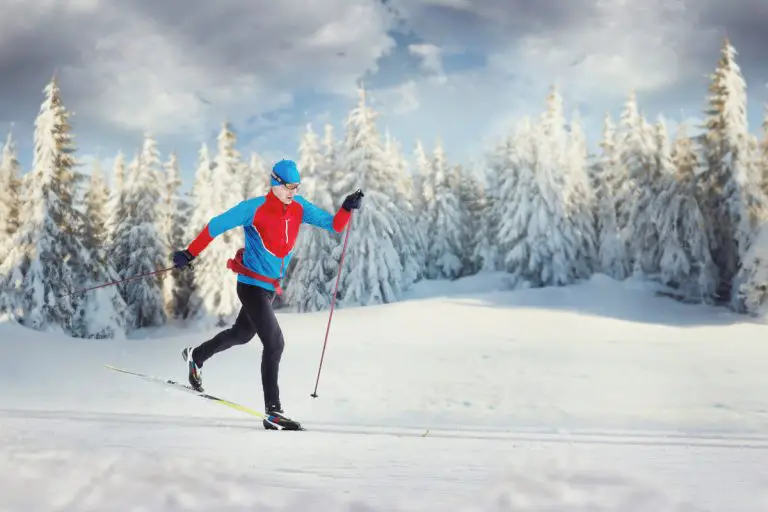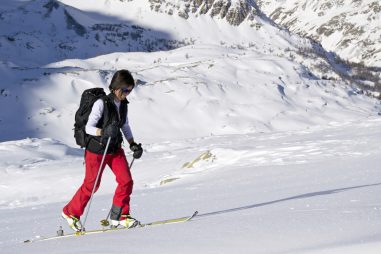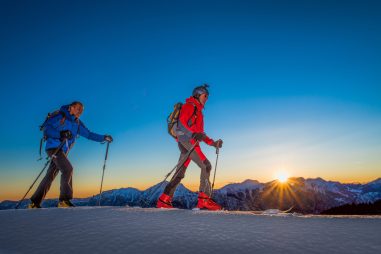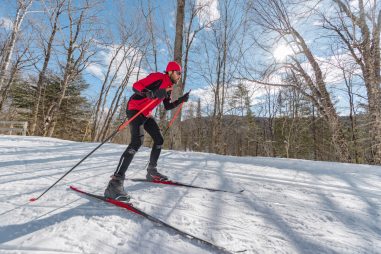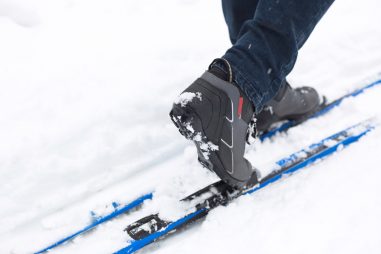Cross country skiing is one of the hardest sports in the world. So why would you get into something difficult? Well, cross country skiing is also one of the best exercises you can get into. While it doesn’t use natural movements as running does, it’s easy to learn with practice and patience.
And once you get the hang of it, cross country skiing can have dramatic positive effects on your body. It can help you lose weight, strengthen your body, and your cardiovascular system. Here’s what you need to know about cross country skiing’s physical benefits.
Is Cross Country Skiing an Endurance Sport?
Cross country skiing is an endurance sport like long-distance running and cycling. But unlike running and cycling which use your core and legs, your upper body plays a significant role in cross country skiing.
And it’s considered the ultimate endurance sport because of the effort needed to push your body across the snow tracks over long distances. Add the sub-zero temperatures and your snow gear’s weight, you’ve got yourself a real endurance challenge.
Is Cross Country Skiing Tough?
Cross country skiing is one of the toughest endurance sports in the world. You need to have a strong body to push yourself on the tracks, uphill, and downhill for a long stretch. If you’re doing it for fun, you can be chill about it. But if you’re competing in a race, you need to be fast and sustain your movements over the whole race duration.
How Strenuous Is Cross Country Skiing?
As mentioned above, cross country skiing is a tough and physically strenuous sport. It requires a lot of lower and upper body strength so you can propel yourself on the tracks. You also need excellent core strength to keep you balanced all throughout your ride.
Whether you’re a professional or a recreational skier, expect the muscle burn to be a normal experience. This is your body telling you that it’s working hard and using every bit of energy you have.
Is Cross Country Skiing the Hardest Sport?
Sports experts rank cross country skiing as one of the hardest sports known to man. You create your momentum and continue this movement for a whole racecourse. This requires balance, agility, muscle power, and high endurance levels.
When it came to evaluating the individual skills for each sport, cross country skiing received a high endurance rating. And that’s a pretty accurate evaluation, given how you need to be in good shape to go cross country skiing. It’s not called the ultimate endurance sport for nothing.
Are Cross Country Skiers the Fittest Athletes?
The fittest athletes in the world include cross country skiers. This is no surprise cross country skiing requires a great amount of physical power and endurance.
Skiers have higher cardiovascular strength, that much is obvious. What’s not obvious is how they’re able to take in and use more oxygen at a faster and more efficient rate.
The difference is anywhere between 5 to 20% higher oxygen uptake. This is what allows them to cross country ski with speed and power over long distances.
Why Do Cross Country Skiers Have High VO2 Max Score?
The oxygen uptake is scientifically classified as the VO2-max. It’s also referred to as a person’s “aerobic capacity” or the maximum oxygen consumption rate when exercising.
In terms of VO2-max, cross country skiers have the highest scores among elite athletes. This is thanks to the high-level endurance training they go through.
This training includes endless hours on the ski trails and the mountains. Here, they push their bodies to perform at or just below the body’s lactic acid threshold. This is what increases their endurance to superhuman levels.
Why Do Cross Country Skiers Collapse?
Cross country skiers collapse at the end of the race because of extreme exhaustion. Skiers utilize their whole bodies in the race. They use every ounce of energy to speed on flat terrain, climb uphill, and go even faster on descents.
And this causes them to collapse, and also often vomit, at the finish line. So don’t be surprised to see a tangled mess of skis and bodies heaving and panting on the snow.
Can You Get Hurt Cross Country Skiing?
Although injuries in recreational cross country skiing are rare, getting hurt is still possible. Minor injuries happen when you fall down or descend from a steep hill. Aside from physical injuries, many people get sick from the cold virus or pneumonia because they’re not dressed warm enough for the cold weather.
But it’s a different story for athletes. Injuries occur more often in training due to fatigue and overuse. Common injuries are back pains, runner’s knee, jumper’s knee, ankle sprains, and more.
Is Cross Country Skiing Low or High Impact on Knees?
Cross country skiing is a low-impact sport. The gliding and sliding movements aren’t as bad to your knees and joints as running is. With running, every foot strike is on hard concrete which can hurt your knees and joints.
Such isn’t the case with cross country skiing. You don’t strike the ground with your foot so there’s less pressure on your knees. However, it’s still possible to experience knee pain for various reasons.
Is Cross Country Skiing Hard on Your Knees?
Cross country skiing can be hard on your knees especially if you fail to warm up, have poor form or technique, or you’re not in great shape.
When skiing, you’re always in an athletic stance where your knees are slightly bent to keep yourself balanced. This position can be hard on your knees if your leg muscles aren’t strong enough. Your weight can also put additional strain on your knees.
Why Do My Knees Hurt After Cross Country Skiing?
Knee pain from cross country is a common injury among skiers. There are various knee injury types but the reasons for knee pain usually stem from any or all of the following:
- Poor Form or Technique especially when landing from a jump, descending on a slope, or braking.
- Poor Physical Conditioning. You have weak lower body muscles or you’re overweight which puts additional pressure on your knees.
- Not Knowing How to Fall Properly. You don’t bend or flex your knees when falling, increasing the chances of a knee injury.
Does Cross Country Skiing Hurt Your Back?
Yes, it’s possible to hurt your back while cross country skiing. Like knee pain, lower back pain is a common injury among skiers. You can experience lower back pain because of:
- Poor technique.
- Low core and hip strength.
- Poor hip flexibility.
Does Weight Matter for Cross Country Skis?
Weight is one of the important factors in choosing cross country skis. You need to get the ski length appropriate to your weight as this will affect your ability to glide on the snow.
The rule of thumb is that skiers on the heavier side should get longer skis. Meanwhile, those who are lighter should get shorter skis.
Here’s another reason why weight matters: the heavier you are, the more effort you need to carry your body. It can also put too much pressure on your knees, increasing the chances of injury.
Is There a Weight Limit for Cross Country Skiing?
There isn’t an official or strict weight limit for cross country skiing. Skis come in different sizes to accommodate different weight ranges. For classic cross country skiing, adults who weigh between 100 to 110 lbs (45 to 50 kgs) use the shortest ski length. Then adults more than 180 lbs (82 kgs) use the longest skis.
Why Does Weight Matter for Cross Country Skis?
Your weight matters because it determines the ski size that you’ll need. As mentioned, your ski size is based on your weight. If you choose the wrong size, you won’t be able to get the support and traction you need on the tracks.
If you’re too heavy for your skis, the tips of your skis will curve upwards and you’ll have no control. If you’re too light, your skis won’t get enough contact on the snow and you won’t get any traction.
Aside from choosing your skis, your weight also impacts the effort you need to produce. Your muscles will work harder to push your body on the tracks, uphill, and downhill. This can cause you to tire easily or make you more prone to injury.
Can You Cross Country Ski if You Are Overweight?
You can still enjoy cross country skiing even if you’re overweight. It’s a great way to burn a lot of calories and get your body in healthier shape and reduce those extra pounds.
But you’ll have to be extra careful and come prepared. The extra weight you’re carrying can make you more prone to injuries.
Can You Be Too Heavy for Cross Country Skis?
The largest cross country skis are usually designed for people who weigh 220 lbs (100kgs) or more. It’s possible to be too heavy for cross country skiing but it still depends on how much you really weigh.
As mentioned, overweight people can still cross country ski. The same goes for those with obesity problems. But if you’re packing too much weight, professional ski trainers suggest that you lose a few pounds first. This prepares your body for the physical exertion required. And more importantly, it allows you to enjoy the sport with a lower risk of injury.
What Happens if You Are Too Heavy for Your Cross Country Skis?
If you’re too heavy for your cross country skis, it’ll impact your ability to ski. Your ski bindings will press down hard on the snow which can cause the tips to rise, even if you have a stiff ski. This makes the skis less responsive and gives you less control.
Also, if you’re too heavy, you might not get the acceleration and speed you want to achieve. You will also find it more challenging to go uphill and downhill.
How Do You Get in Shape for Cross Country Skiing?
Getting in shape for cross country skiing requires building endurance and total body strength. And your training should begin months before your skiing trip. So if you’re going to ski during the winter season, you should start as early as summer.
You can build endurance through running, hiking, swimming, and biking. You can also complement this with high-intensity interval training.
To gain full-body strength and power, hit the gym for weight training. Then to improve your balance and coordination, you can engage in yoga or plyometric exercises.
Is Cross Country Skiing a Good Workout?
Cross country skiing is one of the best workouts you’ll ever have. It’s a total body workout that engages your major muscle groups and your core. It’s an endurance workout that requires balance, body control, and coordination.
The off-season training plus the cross country skiing activity itself can make you the fittest you’ve ever been.
How Does Cross Country Skiing Improve Your Fitness Level?
Cross country skiing can leave you gasping for breath. It’s low impact but high in intensity. It improves your fitness levels because it works your legs, core, and upper body muscles all at once.
Your cardio fitness is tested as you go through the tracks, climb uphill, and descend steep hills. Doing this regularly allows your cardiovascular system to adapt and raise your endurance levels.
Is Cross Country Skiing Aerobic or Anaerobic?
Cross country skiing is both an aerobic and anaerobic exercise. To give you a better idea, aerobic is when your muscles use oxygen to produce energy for you to perform the exercise. In skiing, this is illustrated by the high cardiovascular endurance that athletes have.
On the other hand, anaerobic is the opposite. It’s when your body doesn’t have enough oxygen that it needs to sustain the activity. This is when lactic acid builds up which can lead to muscle cramps when you go over your threshold.
So for skiers, there needs to be a balance of both. It’s having enough oxygen to ski for long distances (aerobic) and sustaining that activity even when oxygen levels are low (anaerobic).
Is Cross Country Skiing Cardiovascular Endurance or Muscular Endurance?
Cross country skiing involves both. Cardiovascular endurance is when you’re able to fuel your muscles with oxygen so you don’t tire easily.
And as you continue exercising, your body starts to fatigue. So muscular endurance is your muscle’s ability to sustain the exercise despite the low oxygen levels.
Is Cross Country Skiing a Full-body Workout?
Cross country skiing is definitely a full-body workout that uses all the major muscle groups simultaneously as you ski. This is what makes it different from other endurance sports that have minimal upper body use.
It’s a great way to get fit, burn calories, and lose those extra pounds you’ve been carrying. It also improves your cardio levels aside from giving your muscles a good workout.
What Does Cross Country Skiing Work?
When you cross country ski, you work the major muscle groups on your legs, upper body, and core. That’s why it’s considered one of the best total body workouts you’ll ever get.
The sliding and gliding movements involve your lower body muscles and hip flexors. Using the pole works your arms, back, and shoulders. As you work your lower and upper body muscles, your core is engaged to keep you balanced and coordinated.
Does Cross Country Skiing Build Muscle?
Cross country skiing’s constant muscle movements are a good way to build muscle. And it can’t be more true when going uphill where gravity forces you to exert more effort.
This is called hypertrophy or muscle growth through exercise. You build and tone your muscles with the constant push and pull movements your body makes. The more you do it, the stronger you become as your body adapts to your training and exercise.
What Muscles Does Cross Country Skiing Train?
Cross country skiing trains your major muscle groups on your legs, upper body, and core.
When using your skis, you engage your hip muscles, quadriceps, hamstrings, and calves. When using your poles, you work your triceps, biceps, lats, and shoulders. And your core muscles are engaged too. This keeps you upright and balanced all throughout the movement. Lastly, you train your cardiovascular system to fuel your body for longer periods.
Does Cross Country Skiing Work Your Core?
It may not be so obvious, but cross country skiing works your core muscles as well. The constant upper and lower body movements require you to engage your core. This keeps you balanced and allows you to have the proper form as you ski.
And a strong core is key to maintaining your balance and coordination. Weak core strength can lead to poor form, lower back pain, or other injuries.
Is Cross Country Skiing Good for Abs?
Your abs will benefit greatly from cross country skiing. Engaging your core is an effective strengthening technique, like how plank exercises work. The good news is that cross country skiing engages your abs the whole time. It’s essentially a core workout too.
With a strong core, you’ll be able to maintain your form and balance. This allows you to execute the right movements without falling down. If your balance is an issue, doing core strengthening and balancing exercises are a must.
Is Cross Country Skiing Good for Back Pain?
As a low-impact sport, cross country skiing is generally good for your muscles and joints. It’s not as forceful as running since you don’t hit the hard surface with each stride. With the proper form and a strong, engaged core, it can reduce back pain.
However, this isn’t always the case. Lower back pain is one of the main injuries that cross country skiers can experience. Poor form and technique, a weak core, and fatigue can cause or aggravate back pain.
If you have existing lower back pains, be sure to prepare your body and practice your technique before you ski.
Can You Lose Weight Cross Country Skiing?
Cross country skiing is an effective way to lose weight. This full-body exercise is one of the best that you can get. You’ll sweat and burn lots of calories even at a steady pace. This effectively torches the excess fat you’re carrying.
How Many Calories Are Burned Cross Country Skiing?
In terms of calorie count, you burn a lot even for just a day of skiing. A recreational skier weighing 200 pounds (91 kilograms) can burn around 600 calories per hour at a slow pace. Naturally, you burn more at a faster pace.
But the calories you burn still depend on the following: age, gender, skill level, body size, muscle & fat index. So the calorie burn rate will still vary for each person.
Will Cross Country Skiing Make Me Skinny?
To a certain extent, you’ll get leaner with cross country skiing. With regular skiing and off-season training, you’ll shed the extra pounds and reduce your body fat percentage. Combine that with the proper diet, your body will undergo a significant change.
Cross Country Skiing vs. Running
Cross country skiing and running are two endurance exercises that are often compared with each other. Both require excellent cardio and can help make you fit and healthy. They both strengthen your core and burn a lot of calories. However, there are still stark differences between the two.
Is Cross Country Skiing Harder Than Running?
Cross country skiing is harder than running. Running is a natural body movement that you learn as a toddler. On the other hand, you need to learn and practice how to cross country ski its technique and movements.
Aside from this, cross country skiing requires upper body strength. This alone already makes it harder than running where you only swing your arms to help with your balance.
Another difference is the gear required. With running, it’s critical to have a great pair of running sneakers that will give you a comfortable ride. With cross country skiing, you have your ski, boots, poles, and the proper ski wear.
Also, running uphill is a heck of a challenge. But skiing uphill? It’s a whole different beast that will push you harder than running could.
Cross Country Skiing vs. Running – Calories
As pointed out in the earlier section, you get a high caloric burn with cross country skiing. You burn around 600 calories per hour for an average person at slow speeds.
For running, studies have shown that you can burn around 400 calories per hour at a leisurely pace.
So at a slow pace, cross country skiing will burn more calories compared to running. But how much you burn will still depend on your pace and other factors like age, gender, skill level, etc.
Cross Country Skiing vs. Cycling
Like running, cycling is also an excellent endurance exercise. But it primarily uses lower body muscles and your core muscles. Your arms are used to steer the bike which doesn’t offer much resistance.
Both exercises can test your cardiovascular fitness. Uphill climbs are extremely challenging in cycling. Also, balance is highly critical for both sports to keep you upright and moving.
But cross country skiing’s technique is more complex. It also requires better coordination along with great balance.
Is Cross Country Skiing Good for Cycling?
If you’re a cyclist, cross country skiing will do you a lot of good. Cross country skiing strengthens your leg muscles, the main body part used in cycling. It also relies on your core so you can have the right form and balance. This makes cross country skiing a good cross-training exercise for cyclists.
Cross country skiing also keeps your endurance levels up. The cardio exercise you get translates easily to cycling as well.
Is Cross Country Skiing Bad for You in Any Way?
There’s nothing bad about cross country skiing. Any form of exercise is good for the human body. And as an exercise, cross country skiing can raise your fitness levels, burn calories, and unnecessary fat. It’s a full-body workout that has tons of benefits.
The only time cross country skiing, or any exercise for that matter, can be bad is when you fail to prepare your body. It’s also bad if you ignore your health risks or existing injuries.

